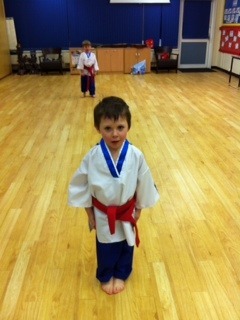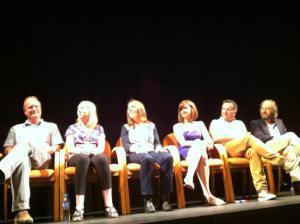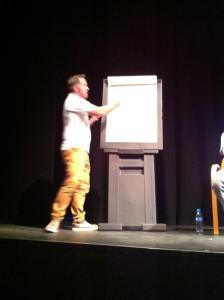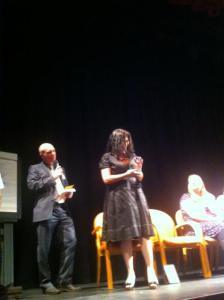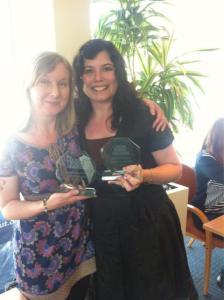Bryony Pearce's Blog, page 3
April 25, 2013
Addicted to …
Occasionally I will get asked why I write.
I have two small children, a bare minimum of time and what I earn doesn’t even pay off the interest on one credit card.

The answer I generally give, especially to students who ask, is that I write because I love it.
But I’m sure any writer (and by writer I don’t necessarily mean published author, I mean anyone who is periodically compelled to sit and get a story out of their head and onto paper) would agree with me when I say it isn’t that simple.
There are many things I love about writing.
I love it when (as Hannibal would say) a plan (or in my case a plot) comes together.
I love it when the story is really flowing and the words come together easily in a sort of magic.
I love it when I’ve had a great day writing, when I come away from the keyboard with an immense feeling of satisfaction (like you have at the end of a wonderful meal).

I love it when I read back over a previous day’s work and think ‘that’s good stuff’.
I love it when I get a book deal (obviously), when I see my front cover for the first time, when my book hits the shelves, when I get a good review or even an award or short-listing.
My Leeds Book Award
But then there is the other side.
I don’t love it when the words don’t flow, when every sentence has had to be forced out, like contractions during labour.
I don’t love it when, at the end of a writing day I look back over what I’ve done and know it is rubbish.
I don’t love that my house is a total mess and I have to choose between housework and writing.
I don’t love it when my back aches and my joints hurt because I’ve been bent over a keyboard for hours.
I don’t love it when I am so jealous over another writer’s immense success that I have to go and give myself a good talking to (be a better person, Bryony).
I don’t love it when I’m kept up at night with ideas and have to get out of bed and go and switch the light on in the study and write stuff down (okay, I kind of do – that one’s mixed, I just wish the ideas would come in the light of day, that’s all).
I don’t love it when I feel like the kids have dragged me away from a story, when it should be the other way around.
Is it that the stuff I love outweighs the stuff I don’t, or is there something else going on?
What happens if I don’t write?
If I don’t write I get antsy. My leg twitches, my fingers itch for a keyboard. I’m looking around for a notebook, a pen, a keyboard, even if I’m out and about. I literally get shaky.
If I don’t write I get grumpier, more impatient and more difficult to live with until I’ve had my next writing fix.
If I don’t write the stories back up in my head until it’s clamouring with voices desperate to be released.
I said fix and I meant it. These are not the symptoms of love; but of addiction. It seems that I write, not out of love, but because I can’t not. I literally can’t not write (as my agent will attest – she’s getting backed up with stuff I’m sending her and I do apologise for that, even though, at the same time, I can’t stop).
So here is my confession. My name is Bryony Pearce and I am addicted to writing.
It could be worse.


April 19, 2013
Ma-Ku-Sho Karate
I hate sport and always have.
In PE lessons we were always split into two groups: those who were naturally good at sports and those who were not. I was a bit of a floater. If there weren’t enough in the ‘good at sports’ group to make up teams, due to illness or holidays or whatever, I was always the one in the ‘not good at sports’ group who was moved ‘up’. But then I spent the whole lesson being not passed to or yelled at.
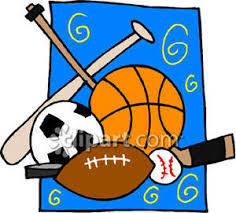
In the ‘not good at sports’ group, the teacher would give us a ball and a basic exercise then ignore us for the rest of the lesson, so she could spend time with those who had sporting potential. During those lessons I was literally in a team with people who, if they caught a throw, would be so excited, they would run around the pitch cheering for themselves!
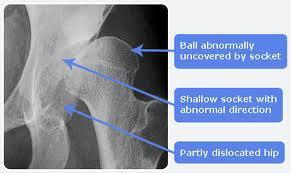 Also, it turns out that at the time I had acetabular dysplasia (which would lead to arthritis and a total hip replacement before I was 30). That explained the limp, my inability to do long distance running (I also hated athletics and cross country) and my constant discomfort.
Also, it turns out that at the time I had acetabular dysplasia (which would lead to arthritis and a total hip replacement before I was 30). That explained the limp, my inability to do long distance running (I also hated athletics and cross country) and my constant discomfort.
Sports was the one thing for which I wasn’t top of the class, the one thing I couldn’t make myself good at, no matter how hard I tried. So you can see why I hated sports.
Since school I’ve tried a few things: rock and roll, aerobics, tai-chi, body-balance, pilates, yoga and working out at the gym with a personal trainer.
I loved rock and roll, but that was a university class, never to be done again. I enjoyed tai-chi, but when we moved from London, there were no classes to be found. I loathed aerobics, especially all the skinny women bouncing around while I struggled to get co-ordinated. I enjoyed pilates for a while, but the hip replacement and pregnancies put a kibosh on that. I didn’t have enough money to maintain the gym membership or personal trainer. Yoga was pure evil.
Since the arthritis was diagnosed in 2006 I haven’t done any exercise at all (apart from walking, does that count?).
This has now changed. When my son turned four he was old enough to start karate lessons. So I took him, and my daughter (years of being bullied has made me think kids should learn self-defence). One day, when I was sat watching, the sensei encouraged me to join in. She badgered me for a couple of weeks then finally offered me a deal I couldn’t resist: all three of us could do the one hour lesson for £10.
I caved and decided to give it a try.
I LOVED it.
I don’t pick things up immediately – I’m not naturally sporty as you know – but I try and then I go home and practise until I feel like I have got the move down (I haven’t gone home and practised moves since rock and roll). I am exercising with my children, showing them a good example. I’m having a lot of fun, losing weight and toning up. I’m in a mixed age class with a lot of kids, so I don’t feel as if I have to compete with the ‘skinnies’. I’m learning self-defence and I passed my first grading with a distinction (I’m now a white belt and ridiculously proud of that, even though the four year old and seven year old are too). I’m learning Japanese words and phrases. I’ve punched through boards, used nunchukus and feel a bit like Bruce Lee.
There will come a point when I can’t progress any further – the hip replacement will make some things impossible: head height kicks for example. And I won’t be able to compete or do real combat stuff in case I hurt my hip. But I want to move up the gradings as far as I can, to do the katas and learn self defence.
I also want to do this as a family activity with the children.
Finally I’ve found the exercise for me. It’s only taken me 36 years.
I guess sport is like reading. When people say they hate reading, I say they haven’t found the right book. And it seems that although I always hated exercise, I just hadn’t found the right sport.


April 15, 2013
Down Memory Lane with an Ice Cream Van
I was just bringing in the laundry when I heard something rare and strange. Something I’ve never actually heard in Bollington before: the sound of an ice-cream van.

I don’t know what kind of salesman would be touting his wares at 730pm on a school night, at the tail end of a day that could best be described as ‘less miserable than yesterday’, but the sound was undeniable. It was an ice-cream van.
The hopeful, somewhat Stephen-King-esque tinkling did not make me rush out to buy an ice cream (it was bloody freezing), but what it did was immediately take me back to my childhood, when I would have, upon hearing the jingles, run (regardless of temperature) to find my mum and beg 50p. By the time she caved the van would be three streets away and I’d have to sprint after it. But more often than not I got my ice-cream.
A very specific ice cream. Not for me your 99 Flake, or your Cider Lolly, not for me your Magnum or Twister. My ice-cream of choice was always a Toffee Crumble. Crumble on the outside, sprinkled over a thin chocolate layer, which coated pure white vanilla ice cream, all surrounding a fudgy toffee centre; on a stick. Sublime.

I haven’t thought about a Toffee Crumble in years, now here I am craving one.
And that childhood sound has also made me think about other things. Back then we had a ZX Spectrum and would spend ages playing a game involving a mouse jumping from level to level chasing some sort of cheesy snack. A game my four-year old would probably have already finished with laughable ease. I also loved those adventure games where you had to type in the instructions.
[You have found a chest.]
Open the chest
[The chest is locked]
Pick up the key
[There is no key]
Use the key (that I bloody know I picked up three screens ago)
[You have no key]
Yes I bloody do
[I don’t understand ‘bloody’]
Kick the chest
[I don’t understand ‘kick’]
Etc.
The games had to be loaded using a tape cassette and would take literally an hour to load every time. There was a high pitched whining noise the whole time it was loading.
I used to pull my long hair into a ponytail so high, it almost flopped over the front of my head and tie it up with lace, like Madonna.
Our favourite TV shows, that we used to rush home to see were Dungeons and Dragons, City of Gold, Ulysses in the 21st Century, He-Man and She-ra, Thundercats. All excellent fantasy fodder for my developing writer’s brain.

And I really fancied Tom Selleck in Magnum PI (still do actually).
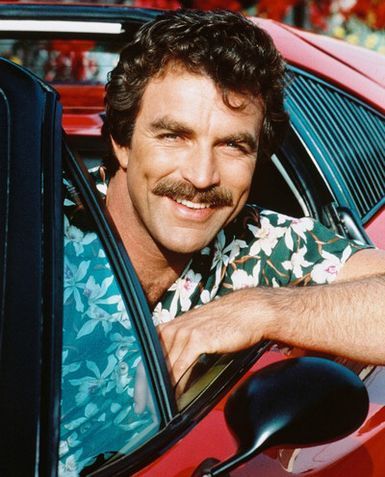
Every weekend there would be a Black and White Western on TV that my dad would make us watch and every weekend there would be a Carry-On film that we made him let us watch.
We grew up with Baywatch, M.A.S.H., Murder she Wrote, Airwolf, The A Team and McGyver.
When dad bought our first video recorder, the first film we ever got out of Blockbuster was Willow.
We used to play Cluedo and Mousetrap and my sister and I would pretend to be TV chefs at mealtimes, making odd mixtures of each forkful of dinner and daring one another to copy.
We had a den in the trees behind our house until we realised that annoying Simon kid from down the street was using it as a toilet.
We used to record the top 40 on cassette, standing hour after hour with our fingers on the pause / record button in an attempt to cut the DJ out of our playlist. Then we’d memorise the words to the songs as best we could and make up dances.
I had roller skates and was deeply uncool because my friends had roller blades. I had a glow worm on my bed, my best friend had a shell suit and I really wanted one, but was never allowed.
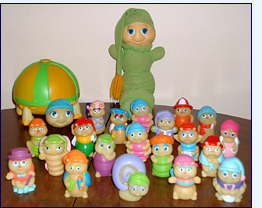
Gosh, that ice-cream van has sent me down a long memory filled journey. It’s amazing how a simple sound makes you remember things you thought long forgotten. I am now on a mission. This week, somewhere, somehow, I will be eating a Toffee Crumble.
And next time I hear the ice-cream van, I’m waking up the kids and sending them out with 50p.


January 2, 2013
When sleep does not equal rest
So its the new year, 2013. I’ve had a wonderful Christmas and am quite sad because today my husband has gone back to work and I’ve had to spend the day tidying the Christmas mess. So far I’ve managed to do about ONE ROOM and I’ve been at it for hours. Time for a break.
I didn’t post blogs towards the end of last year. There was a reason for that. First of all, I did put a list of my top 2012 things on the Strange Chemistry site here but mainly it was because I simply couldn’t write something appropriate. Following the events in the US and China I didn’t feel it right to write something hopeful and cheerful because we live in a world where our children get bullets instead of books. Now it’s 2013 and I have a lot to look forward to, my new book is coming out in August and I’m working on another one, we have a family holiday planned and I’m sure there will be wonderful things to come.
But in the spirit of a new start and still thinking about sad endings, I thought I’d come clean with an article I wrote, but never posted some time ago. When you read it, you’ll see why I wussed out of putting it out there, but a friend of mine was recently really honest on her blog and I wondered if by not posting I was in fact being dishonest.
So here goes, my big confession … I suffer from nightmares …
When I say this, people nod as if they understand what I’m talking about, but they don’t.
I only began to realise this when I was in my twenties. A work friend was talking about this terrible dream she’d had. Two things stood out to me about the conversation. Firstly, the fact she’d had a bad dream was unusual enough for her to comment on and secondly, the dream she was describing wasn’t one I would have categorised as particularly bad. I asked her if that was really the worst dream she’d had.
Her reply? She had bad dreams very rarely and yes, that really was, for her, a terrible nightmare. I questioned her more closely. “So … you don’t dream about monsters, death, blood, gore?” The look of alarm on her face made two things clear. I wasn’t normal … and I shouldn’t talk about it in public again.
So when I tell you now that I suffer from nightmares I mean that every night I am woken up at least twice from dreams bad enough to make me sweat and my heart pound, then during the day I’m haunted by images from my dreams the night before.
It used to be the case that I would wake up screaming, that my sheets would be torn, that I would have bloody scratches on my own body. Things aren’t so violent now but when I first started sleeping in the same bed as my husband I would punch and kick him in my sleep.
My dreams vary in extremity and levels of graphic detail. They’re much worse during times of stress, and I honestly can count the number of times I’ve had a good night’s sleep on the fingers of one hand. The last time was the night after my hip replacement (in March 2007) – I was dosed into unconsciousness by morphine and had a catheter in, so I didn’t even need to get up to use the bathroom (bliss).
The night before my wedding stands out. I slept in my old room at my parent’s house, but my mother had, at some point since I’d left home, removed my bedside light. I hadn’t noticed when I went to bed, but when I woke up at 1am and reached to turn the light on, I couldn’t, because it wasn’t there. I honestly was too terrified to get out of bed, cross the floor and go to the main switch.
A grown woman, about to get married was too frightened to put her feet on her own bedroom carpet in the dark in case some … thing grabbed at her from under the bed.
I sat hugging my knees and crying until it got light. It seemed a better option than calling for my mother.
Now I’m a mother myself I often dream about terrible things happening to my children. Before the children I would more commonly dream of my friends and family hunting me with murderous intent.
Sadly my earliest memories are not family occasions; they aren’t of my mum and dad, or younger sister. My earliest memories are of my earliest nightmares.
My earliest real recollection is of my mother installing a nightlight in my room. I had hysterics when it turned on because I thought the monsters had actually come into the house to get me. She had to throw it away.
I had counselling when I was in London. The NHS gave me eight sessions for free. The counsellor then suggested that I would need private sessions twice a week for two years … at a cost of £40 per session. Needless to say I decided to put up with the nightmares and continue to pay the mortgage.
I tried hypnotherapy last year at a cost of £50 per session. I gave up after two sessions – it seemed a very costly waste of time.
Why do I have the nightmares? I honestly don’t know. Perhaps I have an overactive imagination which has turned on me. Perhaps it was a single incident from before I can remember, although I consider that unlikely. Perhaps it has something to do with my Victorian style upbringing. Or maybe it’s just that I, as a person, don’t have the facility to deal properly (i.e. consciously) with life’s ups and downs.
I don’t think I’ll ever really know.
.So in the spirit of breaking silence, my biggest admission is that I’m now on antidepressants. My prescription acts as a sedative so I can actually get some sleep, but I still have a little way to go before I find out if the tablet will change my brain chemistry enough to alleviate the nightmares. If I’m honest though, I’m concerned that a change in that department might make me unable to do what I do best … write.
I always wanted to be a writer, but I had no real confidence in my ability and no story to tell. Then a few years ago an idea for a novel came to me. The main character was a teenage girl who suffers from nightmares; the same nightmare over and over again. I had a very clear picture of my character, I knew how the nightmares affected her and how exhausted she was, but I wasn’t sure of her story.
It took me a while to work it out, but eventually a blend of Hindu and Christian mythology gave me my answer. Cassie had been reincarnated and was dreaming about her previous life.
My nightmares gave me my inspiration and my sleepless nights gave me time in abundance to work out my storyline. Once I had it clearly in mind I was driven to write. I did so in the daytime while my daughter was at preschool, or in the evenings when she was asleep. It took me seven months to write Angel’s Fury and to my great joy it was bought by Egmont and published in July 2011, it has won awards and people often tell me how much they love the book.
After the success of Angel’s Fury, I was worried that the character of Cassie was so personal that I wouldn’t be able to write anything else. But in fact I’ve written two and a half other books, I have outlines for two more and lots of ideas.
I recently spoke to a lady who suffers, just like me. Speaking to her let me know I wasn’t alone and gave me the courage to speak out honestly about my condition. She asked me to let her know if I ever found a solution.
I’ve got something amazing from my nightmares – the fulfilment of a lifelong dream, but it’s time to get rid of them.
So there you go, I’m starting 2013 in a spirit of honesty and good mental health. Oh and, I did say that I wrote the article a while ago, so in case you are wondering if the pills are working, I can tell you that things are much improved.


November 20, 2012
The Next Big Thing
So I guess the idea of The Next Big Thing is to help people find brilliant writers they might not have encountered. Each writer answers some questions about their work, then tags five other writers who do the same thing. I was tagged by the lovely Niel Bushnell, author of Sorrowline. I’m pretty sure this whole experiment is going to go quantum fairly soon, but before it does … here are my answers.
1. What is the working title of your next book?
My next book is called The Weight of Souls. It will be published in August 2013 (so not too long to wait) by Strange Chemistry, teen imprint of Angry Robot books.
2. Where did the idea for the book come from?
My brain is such a melting pot, that I am often not sure where an idea originally comes from. As a teenager I was fascinated with Ancient Egypt and read book after book about the pharaohs, gods and life back then. I was particularly interested in the so-called curse of the tomb of Tutankhamen. The central concept of The Weight of Souls is that Anubis is trapped in Queen Nefertiti’s tomb by the priests of Horus and that in the 1800s an expedition discovers the tomb … and an extremely irritated Anubis. The lone survivor agrees to work for him and so his whole line is cursed with the ability to see ghosts and the duty to avenge unnatural deaths by sending murderers to Anubis for judgement.
Taylor, my main character, is also bullied at school. This is something I can strongly identify with (I have written a post about some of my experiences at Dear Teen Me ) and specific incidents that happen to Taylor are strongly based on things that happened to me.
3) What genre does your book fall under?
I suppose it’s a dark paranormal romance / supernatural thriller. My first book (Angel’s Fury) also defies simple categorisation.
4) What actor would you choose to play the part of your character in a movie rendition?
This is a difficult one. My main character, Taylor, is half Chinese, so I think the best actress would be Katie Leung, who played Harry Potter’s girlfriend.
5) What is a one-sentence synopsis of your book?
Taylor has enough problems, what with seeing the dead, avenging their deaths and trying to persuade her father that she isn’t crazy; then her worst enemy, Justin, gets killed … who did it and can she avenge his death before her soul becomes the one on the line?
6) Will your book be self-published or represented by an agency?
I am represented by the hugely talented Juliet Mushens and The Weight of Souls will be published by Strange Chemistry.
7) How long did it take you to write a first draft of the manuscript?
The first draft took me about seven months, but then I do have two small children …
8) What other books would you
compare this story to within your genre?
Obviously there are similarities to Angel’s Fury (my first book), particularly in terms of style. I think anyone who enjoys romance, thrillers and supernatural elements in a book will enjoy The Weight of Souls.
9) Who or what inspired you to write this book?
I wrote this book while I was waiting for Angel’s Fury to come out. I’ve always wanted to be a writer and as a teen was most inspired by Anne Macaffrey – her books are such amazing, character driven tales, I cry every time I read The Ship Who Sang and I like to think that my own work is similarly character driven.
10) What else in the book might pique the reader’s interest?
The Weight of Souls book has Egyptian gods, ancient curses, ghosts, a murder mystery, friendship, love, sacrifice, redemption and a zombified army of ten thousand undead killers. Seriously, what more could you possibly want?
Now I get to tag five other wonderful writers. It’s hard to find five authors who haven’t already been tagged … but I’m thinking … Sarwat Chadda, whose wonderful Devil’s Kiss is among my top favourite books. Tom Pollock, whose book City’s Son is completely amazing and also one of my all-time favourites. Steve Feasey, author of the gripping Changeling series … I can’t think of anyone else who hasn’t been tagged so I’m going to cheat and put in a circle here (see it’s gone quantum already). So I now restrospectively tag the author of another favourite, Firebrand - Gillian Philip and Laura Lam, whose book Pantomime is definitely going to be a ‘big thing’ …


October 3, 2012
School visits, a hopefully helpful guide by Bryony Pearce
First up, let me say that I am not an expert and I’m not claiming to be. I’ve been doing school visits for well over a year now, but there are authors out there who have been doing them for over twenty years and have a lot more insight than I do. However, I recently identified a need for debut authors to have some kind of central information source, so I thought a post about school visits from someone who has done a few would be helpful.
While planning this post I also polled a few friendly librarians and I include their comments as they are experts.
My first school visit was terrifying, I had no idea what to expect and the thought of receiving that ‘I’m bored’ look from a room full of teens gave me the shakes. I hope that my hints and tips below will alleviate those shakes a bit for some lovely debut authors.
Working with your publisher
Hopefully your publisher will be organising your first school visits for you. With any luck they’ll have asked you for a list of your local schools, will have done all the legwork and will even send along a publicist to hold your hand for the first couple of events (unless of course they’ve confused you with another author and not in fact remembered to do this for you, cough, cough).
But this doesn’t always happen. If you haven’t already been asked to provide contact details for your local schools, please do ask your publicist if they are willing / able to organise visits for you and if not, don’t worry you can do this yourself.
Working with a book shop
Heartbreakingly, the number of bookshops in Britain has halved since 2005 and nearly 600 towns have none at all. If you still have a local bookshop, obviously you see the need to cultivate a good relationship with them; hopefully they’ll be stocking your book and pushing it to interested customers. But did you know that many book shops also organise school visits and events themselves as a way of increasing their book sales?
If your book shop does book you for events it will save you lots of leg work. I have had a number of school visits via Urmston Books and Formby Books, and Simply Books (my closest bookshop) has not only had me in to speak to their book group, but has given me three events over the half term period (workshops for the kids) for which I will be paid.
The Guardian has a useful list of London independent book shops here: http://www.guardian.co.uk/books/2011/oct/01/independent-bookshops-london
They also have this rather excellent interactive map showing the best book shops around the country.
http://www.guardian.co.uk/books/interactive/2012/may/31/best-bookshops-map
I heartily recommend that, if you are willing to travel to the Liverpool area, you speak to Tony Higginson of Formby Books (http://www.formbybooks.blogspot.co.uk/) – he organises dozens of events and is a specialist in doing so.
Contacting book shops:
If possible make a point of popping into your local independent book shop a few times prior to publication. Get chatting to the staff, let them get to know you a bit. Then do your big reveal when they already see you as a friendly face, who has been supporting them (after all, if you’ve been supporting them, they’ll be happier to support you). It’s sneaky, but not in a bad way.
If you haven’t been into your local independent bookshop before publication (and I’m not judging here – let’s face it, for some of us our local indie is a half hour drive away and Waterstones is nearer) do pop in and introduce yourself (but pick a quiet time – don’t do it at lunchtime on World Book Day – not that I did that, ahem)
Do take a copy of your book (otherwise they might think you’re a random crazy person)
Do mention your publisher, especially if it’s a mainstream one – bookshops obviously get inundated with local self-published authors. They sit up and take notice if they have a local author published by a big name publisher.
Do compliment the bookshop and make sure you buy at least one book (as I said – why should they support you, if you don’t support them?).
Do give them a bit of information about you, what you do during school visits and what you charge (if you charge – it’s a contentious issue, some authors do and some don’t – we’ll come to that later). Make it clear you are happy to support the shop by doing events (e.g. talking to their book group, doing a writing workshop or doing a signing).
Booking school visits
Working with book shops is brilliant, but you might also want to organise a few school visits yourself, especially to get the ball rolling. Your book shop will obviously be happiest to get you gigs if they hear from a school you already went to that you did a great session for them.
Finding a school
Make a list of the schools you’d like to visit. I recommend doing a local ‘friendly’ first (your child’s school, a friend’s child’s school, your old school, or a school where a friend teaches). Make it clear it’s your first one and say you’re doing it for free in return for an honest testimonial and they should be super nice to you and give you a nice quote that you can impress other schools with.
Think about why you are doing the visit
Do you want to spread a love of literature or creative writing among children or teens. Do you need to earn money? A combination of the two?
Most authors will use a school visit as an opportunity to sell books (absolutely correctly – you need those Nielsen figures), but please do think about the school and the children as well. An hour-long sales pitch is no fun for anyone.
What do you hate authors to do?
“A sales pitch; rely too much on PowerPoint” (Kings)
“Just talk about themselves for the whole hour!” (Wilmslow High)
Make sure your event is a mixture of talking about you and your book, reading from your book and also talking about reading, writing and using your story as an inspiration for activities.
During my own events I use the fact that the main characters are reincarnated to get the kids talking about past lives. I also use my research into psychological techniques and the war as an excuse to do my own version of the Milgram experiment where they get to ‘electrocute’ me. They love it (I think).
Deciding on fees
Gosh, this is a controversial area. I recently had my own publisher say they wouldn’t be able to organise me school visits in Leeds (after I won the Leeds Book Award which was voted for by Leeds schools) if I wanted paying for them.
Yet, how else is an author with a miniscule advance (yes, I’m talking about myself here) supposed to earn money from their work?
Schools and local authorities are accustomed to paying experts for their time and skills, and remember, schools would probably pay less for a supply teacher without your expertise in this area.
Think about how much you would have loved an author visit when you were at school and apply that in reverse – the kids will love to have you in. You are a valuable resource.
The rates recommended by the Society are £350 and £250 respectively for full and half-day engagements (to cover a maximum of three sessions in a day), plus expenses. They suggest
a fee of £150 for a single session not exceeding one hour (plus expenses) when the author is visiting a local venue or carrying out a number of separate visits e.g. to schools in a single area.
Many authors however, don’t feel comfortable charging hard-pressed schools for author visits while some simply lack the confidence to ask for a fee.
Obviously it would be great if all authors agreed on a policy; if we all charged at SOA rates so there was no undercutting and all schools were aware of what an author visit would cost. That way there would be no awkward fee discussion and no misalignment of expectations.
However, even among The Edge there is a huge disparity in what we are happy to charge for individual school visits.
My own policy was that I did a year of free school visits – mainly because I felt that I wanted to have the experience and develop a really polished event before I started charging for it. However, I now charge and yes, I am still getting bookings.
CRB checks
No, you should not need a CRB clearance. You should never be left alone with the children – a teacher should be with you at all times there are all sorts of public liability issues with them leaving you in charge.
Approaching a school
So once you’ve decided which schools to approach, you need to make your initial advances.
Some schools do prefer to contact authors themselves, so if you get a no at this stage, don’t be offended.
“I prefer to contact authors myself. It’s nice and often easier to have direct contact with the author. Also great if occasionally a publisher or author contacts me with an offer.” (Kings)
My friendly librarians indicated that they most like to be contacted in the autumn term and most commonly organise visits for Feb / March (World Book Day) and June / July.
“I start thinking about World Book Day in October but haven’t always been successful securing someone so definitely worth trying for World Book Day right up to February. Summer term is much quieter, so just before Easter is also a good time.” (Wilmslow High)
Personally I like to approach schools the same way I approached getting an agent.
Do your research – call the school and find out who is best to talk to – is it the librarian, the head of English, the head teacher (it’s commonly the librarian, but not always)?
Find out when would be a good time to have a quick word with them and call back then.
Write yourself a script for when you get through to the right person (if you’re like me the conversation would otherwise be filled with awkward silences and the dreaded ‘um’), briefly introduce yourself and ask if they’d be interested in an author visit. If you can’t get through, then send a nice, personalised email.
If you get a yes, then say you will send an information pack.
“As we are busy during the day you can’t guarantee to get hold of us on the phone. Email just seems the easiest and most economical way – but don’t make it look like a bulk junk mail type of email.”(Wilmslow High)
Putting together information packs
I would recommend including the following (list provided by my friendly librarians):
A copy of your book
Author history
Reviews of the book
Testimonials from previous events
What you do during the visit
Length of proposed visit
Age of children appropriate for visit
What you would need from the school (in terms of equipment on the day)
What you expect from the school (in terms of prep prior to the visit)
How much are you selling copies of the book for? Do you need the school to contact a book shop to come in, or are you bringing your own books?
Cost of visit
Contact details
Web address or place where you can get further information
I’d also offer reading notes for your book.
Although your instinct would be to chase up if you haven’t heard after a certain time period, my friendly librarians indicate that this would not be appreciated. Still, a quick email to make sure they received the pack and ask if they have any questions would probably be received without adverse reaction.
Working with the school
If you get a school visit booked, that’s fantastic.
Prior to the event make sure you know what time you are expected and that the school knows what you need (a projector, flip chart etc.). Get directions and any special instructions (I went to a school where it turned out you had to pay to get into the car-park, but I had no wallet with me – I ended up dumping the car outside a nursery and getting glared at a lot).
Try and get the school on board to do some advance preparation. The best visit I had was where the librarian had printed out the first three chapters of the book and asked the kids to read them in advance. They’d talked about the book beforehand and come up with questions, it was brilliant. I sold a book to every member of that audience!
In non-fee paying schools the librarian will need to remind kids to bring their money on the day (preferably more than once and in big red letters). Many kids will still forget, or won’t bring any because they think ‘I won’t buy a book’. This often changes when they actually meet you and of course then, they can’t buy the book because they have no money. It is worth speaking to the book shop dealing with the school to see if they’ll sell books ‘on a promise’ – some do, some don’t.
Make sure your first chapter or so is on your website, so if the teacher is busy they can at least point the children to the site to get a taster of your work ‘out of hours’.
Arriving at the school
Aim to arrive half an hour in advance, it seems obvious, but you’ll need that time to say hi, settle in a bit and set up your PowerPoint presentation (if you’re using one). I’ve lost count of the number of times the projector and laptop have had to be forcibly connected by a harassed IT guy after the librarian and I have given up. Without that half hour prep time, the kids would have been watching their visiting author swear about technology and thump her laptop – not ideal.
Do’s and Don’ts
I’ll let my friendly librarians talk to you about this one:
What do you like authors to do?
“ Interactive ingredients are always popular; performing / reading their own work; audience participation / getting children up at front to participate; incorporate activities, maybe encouraging them to reflect on how they write / their own lives” (Kings)
“Talk about themselves and how they got into writing, book readings, give children chance to ask questions, fun activities relating to their books, anything interactive, quizzes, workshops…depends on the format of the session and the intended audience.” (Wilmslow High)
What do you most like an author to talk about?
“How they got into writing; how they write; their own work” (Kings)
“How they got into writing, how much they love reading, teen fiction they have read, anything ‘cool’ about themselves to help the children realise reading and writing are not just for nerds!” (Wilmslow)
Can you give examples of particularly impressive events?
“Sophie McKenzie and Bryony Pearce – interactive games for the children to play relating to the book; Curtis Jobling drawing characters on stage, Paula Rawsthorne very down to earth chatting to the children about herself, Matt Dickinson showing exciting photos of his travels that inspired him to write.” (Wilmslow)
Any disasters?
“A football poet who had no idea how to relate to children and just talked at them for an hour.” (Wilmslow)
Your presentation
It is good to have a non-essential PowerPoint presentation. A presentation gives the students something to focus on and is a reminder for you – if you forget where you are, your slide will give you a nudge. You can also include things like photos of yourself as a child or teen, which are always funny.
However, I can also do my ‘bit’ without a presentation and that’s important – I’ve been to schools where the laptop and projector just would not marry. I’ve been to visits set up by my publisher or another contact where the presentation was never received by the school. If you rely too much on technology it will inevitably let you down one day.
Useful things to have
- Bookmarks or postcards: it turns out that people will do an awful lot for a bit of shiny cardboard. You can have a room of recalcitrant teens all putting their hands up if they realise they get a bookmark for answering a question (go figure).
- If you can afford it, perhaps offer something even more highly prized than a bookmark – Steve Feasey has pens with a sort of pull out banner in I’ve seen kids literally fighting over those.
- Some authors (e.g. Miriam Halahmy) offer a prize (a copy of their book) if the students can correctly answer a question about them or their book (this may require the students to look at the author website or read the first couple of chapters in advance of the visit, or simply pay attention during the talk). This can reap excellent dividends, but of course costs you a book!
- A ‘gimmick’. Think about your book and what it lends itself to in terms of audience participation / interactive activities / discussion topics. A gimmick that gets the kids fired up and talking afterwards will make you a popular visitor.
Finally
It’s worth preparing answers to a few questions in advance – you will ALWAYS get asked what your inspiration was and often asked how much you earn and if your characters are based on real people.
Leaving
I often leave behind a non-compulsory creative writing competition. I make sure that I get the teacher’s go-ahead in advance and allow the teachers to set the deadline (according to the student’s workloads).
I let the students know that they can follow me on Twitter, or on my author Facebook account and to email me via my website if they would like to.
I also leave an invoice! On your invoice you should probably include …
Your name and address
The school name and address
The date of the invoice
The date and title of the event
The name of the event host
Your invoice number (Advisable particularly if you are VAT-registered.)
The fee
Details of agreed expenses (You may also need to supply receipts)
Your ten-digit UTR (Unique Taxpayer’s Reference) number
Your National Insurance number
Your VAT number (If you are VAT registered)
Name of bank, branch address, sort code, name of account,
account number (If you will be paid by BACS)
If appropriate add:
This service was provided by a self-employed tax payer. It is
therefore a booking condition that payment [plus VAT if you are
VAT-registered] be made in full, as per invoice, and that income
tax etc. should not be deducted at source.
You may also want to add:
Payment is due within 30 days of invoice date. Statutory interest
will be charged on overdue payments.
And make sure you thank the librarian profusely. They are busy and their hard work got you in there. Hopefully they’ll even ask you back one day.
For more information on school visits, the SCBWI has a school visits discussion group on the NING.
Good luck. I hope this helps a little bit. And please feel free to add your own experiences, hints and tips – like I said, I’m no expert … Thanks for reading.


September 21, 2012
Divorcing Fact From Fiction
One particular book has been all over my radar for the past few days. People whose opinions I respect absolutely love it. So I looked it up, all ready to put it on my Amazon Wish List. Then I stopped.
‘Child 44’ is set in Stalinist Russia and I cannot read books that involve horrifying situations derived from real life.
What does that mean?
Basically I can’t read anything set during a war.
Not WWII (No Sebastian Faulks or Stephen Ambrose for me), not World War I, not Vietnam … not even cowboys and Indians. I simply cannot read books set in a situation where real life atrocities have been committed on a vast scale.
These so called fictional books make me think of the true stories that inform them. I cannot stop thinking that the true stories are in so many cases, so much worse than what I am reading.
The fact is, when I read a book set during a war, I simply cannot divorce fiction from reality. Unless the writer introduces aliens or fairies, they cannot tell me the tale they are writing didn’t actually happen. Because it probably did – a dozen different times – the board is too full of players for the impossibility to be considered.
In the first world war the total number of military and civilian casualties was over 37 million. Thirty seven million! You cannot tell me that on a stage that size there were no epic love stories, murder mysteries, tales of valour, honour and villainy. Every story that an author could conceive would have been acted out.
So you cannot tell me that the tale I am reading is ‘just made up’. The details may have been concocted by a novelist, but I know the story happened all the same.
I cannot read a book about the war without remembering the terrible things that man does to man, even now.
And it isn’t just books – I can’t watch war films, or TV series either. The last one I tried to watch was a David Jason miniseries called ‘All The Kings Men’. After the last episode Andy came home from work (late) to find me literally hysterical. I’d been sobbing for two hours.
I can’t do it. I don’t care how good you say it is. I haven’t watched Schindlers List, The Thin Red Line, Saving Private Ryan, Birdsong.
For the same reason I won’t watch anything subtitled ‘based on a true story’.
It isn’t violence I have a problem with. I’ll happily go and see Dredd. The Avengers is my favourite film of the year. I enjoyed Kiss, Kiss, Bang, Bang and Batman not long ago. Fantasy violence is fine. Horror is fine too. I recently enjoyed the Aliens Quadrilogy and Woman in Black.
But if it isn’t fantasy, sci-fi or paranormal, you can keep your violence.
But … and this is the strange thing. The past lives of the protagonists in Angel’s Fury are set during the holocaust.
I had to do a lot of research, from Hitler’s rise to power, to the Nazi Youth, to the weaponry. I had to imagine myself in the role of a little Jewish girl and a Nazi. I had to write two death scenes, one for each.
Why? Why can I write something set in a war, live in it within my imagination, yet go out of my way to avoid watching or reading it?
I’m genuinely not sure, but maybe it’s because if I’m doing the imagining, I know it isn’t real. I actually can divorce the fact from the fiction.
Weird though …


September 13, 2012
Big News!
I’m thrilled to be able to finally tell you my big news. I’ve been sitting on it for what feels like forever, but I can shout it from the rooftops now.
Being a debut novelist with a one book deal is a roller-coaster. It is both wonderful (my life’s ambition to be a writer has been fulfilled) and terrifying. Why terrifying? Well, there is the inevitable fear that no-one will like the book. Then when that has been alleviated, by good reviews and even an award, the next fear hits. Will I ever get a second book deal?
It seems churlish to give voice to your fear, especially when you are surrounded by talented authors who have yet to hook their first deal, but for a second deal there is increased pressure. ‘When is your next book coming out?’ seems to be all you hear. And how gut-wrenchingly embarrassing to have to say you don’t know.
You worry that if there is too great a gap between publication dates you will lose your momentum and the people who liked your first book will forget who you are.
As you write your second book and start the whole sales process again the fear grows – have you had your chance and missed it? Was that actually your whole career – been and gone in a flash?
I’ve been struggling with this over the last year, but finally, for all you lovely, interested people who have been asking me that question ‘when is your next book coming out?’ I can give you an answer.
My next book is coming out in October 2013. I actually received the good news myself last month, but had to keep it under wraps until my new publisher gave me the go-ahead.
Yes, you read that right – my new publisher.
Angel’s Fury was published by the wonderful Egmont, but with a new book, came a new agent and a new publisher – The Weight of Souls will be housed with Strange Chemistry, the new teen imprint of Angry Robot Books.
I’m so excited to be moving to Strange Chemistry with my new book, I have read a couple of the other YA novels they publish and feel as if I and my work will fit in really well there. Strange Chemistry has a family feel and I am thrilled to become a member of the family.
If any of you have been looking at my website over the last year or so, you may be familiar with The Weight of Souls under it’s working title The Society. It is about a teenager who must avenge the death of any ghost that touches her and who discovers the truth about her family’s frightening curse while avenging the death of a classmate she cannot stand – or at least that’s how her feelings start out.
I’m so happy to be able to say I know when my next book is coming out and I can’t wait to share Taylor’s story with you next year.


June 7, 2012
Teenagers – how do you find the time to read?
I was hoping to be writing a very different post this week, but the publishing industry being what it is, that post won’t be happening any time soon (boo).
So I’m doing this instead.
I was in Chester on the 23rd May, at the schools literary quiz, giving out the prizes. The schools taking part did amazingly well – I’ll admit that most of the the questions had me stumped. And the winning school richly deserved their win. I’m thinking of poaching a couple of their team members for the Bollington Festival literary quiz that I’m organising in September.
Anyway, I had to give a speech and was asked to talk about teenagers and reading – this is the speech I gave …
I’m so honoured to be here and see so many teenagers, so avidly interested in reading. And that’s what I’d like to talk to you about – about reading and how important it is. I realise that I’m preaching to the converted here, but that’s what will make you such a nice audience …
I was an RAF kid – I moved around a lot and that made it hard to have good friends for any length of time. You’d meet someone and three months later they’d move. You meet someone else and three months later, you’d move. This made me a fairly solitary child.
Obviously for me reading was escapism into worlds where I had friends who never went anywhere – every time I opened a book with a bent spine and dog-eared pages – there they were, waiting for me. It was action and adventure – my favourite books at that time were heroic fantasy and science fiction – Anne MaCaffrey, David Gemmell. I could literally get lost inside a book.
But reading was more to me than that. It was a way of connecting with my Dad, who was away a lot. We had the same taste in literature. As a teenager I worked my way through his entire bookcase – Isaac Asimov, Robert Heinlein, Larry Niven, Philip Jose Farmer, Frank Herbert – and that gave us something to talk about – a common ground. I remember long conversations with Dad about books, about writers, about stories. He was my first sounding board for ideas. He was my first and most avid supporter when I started writing. He’s still desperate for me to write about dragons …
And reading was more to me than that. It was something to do – my parents wouldn’t have a telephone in the house, we had one TV (with only four channels) and that was only allowed on from 6pm so the adults could watch the news. We had a Sinclair ZX64 computer – not exactly a Nintendo and in those days there was no email, no mobile phones, no YouTube. On a Sunday afternoon there was the Top 40 on the radio, but other than that, if I wasn’t doing homework, I was reading. In almost every photograph of me as a teenager I’m reading.
And more – reading has given me a university degree – I did English Literature at Cambridge, not possible without a wide reading background, I’m sure you will agree. And it has given me a career. I wouldn’t be a writer without reading. Reading books by other writers inspires me, teaches me, raises my own work to a higher level.
That’s me and it’s pretty obvious why I needed to read – but what about you?
How can you possibly find the time?
Seven hours and 38 minutes.
That is how long the average teen devotes to using entertainment media in a typical day. Television, films, social networking, texting, youtube, computer games, iPhone, music.
Yet despite all these areas increasing, the time spent reading books has remained pretty steady.
Why? Why haven’t you dropped reading in favour of watching films or gaming? What does reading give you that those other media cannot?
Why is reading so important to you?
Well I guess, on the practical side reading helps you improve your language skills. It helps you with vocabulary and spelling.
It helps you feel all sorts of emotion – happiness, sorrow, hate, love. A 2008 study found that people who read more fiction score higher on tests of empathy and social acumen.
Reading widens your experiences, takes you on adventures – gives you things to talk about, challenges your thinking.
It’s proven that people who read are better writers and public speakers. Seeing how different writers put down their thoughts enables you to better communicate your own.
In fact studies have shown that teens who read actually do better in their careers. One particular study conducted with 17000 people showed that teen readers were 10-14% more likely to rise to a professional or managerial position
But why read instead of watching television? Most modern television programming is designed to capture your attention by constantly pinging your brain with abrupt sounds and transitions. This can create stress. Research at the University of Sussex has shown that reading reduces stress levels by up to 68 percent.
Yet reading is active, not passive, you are involved: you need to concentrate, imagine what the world is like, what the characters look and sound like. You become a part of the story by creating all these things with your imagination.
You become complicit with the author, you work alongside the author to bring worlds to life.
Without you, the reader, I the author am nothing.
So on behalf of all authors – thank you. Thank you for working with us to create great loves and epic battles, worlds beyond our own and adventures beyond those we can have on the school run.
Reading is good for your mind, your body and your future. You are all readers. You all know what reading means to you. You know how important it is to get lost in a book. Now you have an answer if someone tells you to stop reading and do something useful …








May 25, 2012
Good things come to those who wait
It’s been a while since I’ve blogged. To be honest, I’d come to a bit of a standstill. I’ve still been writing (you can’t stop me doing that), but I was starting to wonder if this was it – Bryony Pearce, author of Angel’s Fury, one book wonder; the Nizlopi of literature. My mum has always told me: if you’ve nothing good to say, say nothing. So that’s been my policy recently.
But now, now I have good things to say!
Part of my problem was that I had come to an impasse with my agent. Lovely as Sam is, we decided to part ways earlier this month. I immediately signed on with the wonderful and incisive Juliet Mushens at PFD and her enthusiasm for my work has just galvanised me. I’m writing like a mad thing now and am so positive for the future.
So that’s one good thing.
The next good thing is not just good, it’s amazing. Yesterday I went to Leeds to attend the Leeds Book Award. Mine was one of six books shortlisted for the 14-16 category.
I arrived a bit early (to the consternation of the organisers) and was ensconced in a room to await my fellow writers. I chatted with existing friends – Harriet Goodwin, Janet Foxley, Curtis Jobling, Will Hill and Paula Rawsthorne and met some new ones – Annabel Pitcher, Ally Kennon, Martyn Bedford and Zoe Marriott.
The lovely girls of Ossett High School were assigned to look after me and I spent some time chatting with them and answering some challenging questions (which past life would you most want to have lived? I went with Shakespeare’s right hand man and Euripedes – I was put on the spot, OK!) before going into the packed auditorium where I faced a stage with six spot-lit seats. Somewhat intimidating.
Thankfully the 11-14 category went first.
Dave Cryer, the compere said something about each book and each author was passed the microphone in order to answer questions from the audience.
It looked very hot up there.
Curtis Jobling did some amazingly fast drawings of Bob the Builder and Paula answered offered tips for aspiring young writers (daydream!).
Then it was time to find out the winner.
And it was Paula Rawsthorne. She took the award with lovely calm aplomb and had the presence of mind to thank everyone beautifully.
The other writers also received glass awards shaped like diamonds. Excellent, I thought, I’ll have something to show Andy when I get home!
Then it was our turn – the 14-16 category. I’ll be honest, I thought I had it solved. Martyn Bedford was going to win. His excellent book was doing really well and he had a huge round of applause when he stood up to go on stage.
We all answered our questions, somewhat nervously. Zoe Marriott told a wonderful story about wearing a kimono so she would understand how her character’s clothes would affect her movement – which goes to show how much research we authors do!
Then the winner was announced.
There was a drum roll (provided by the audience patting their knees) then the girl who was reading the winner out said ‘Mmmm’ and fell silent – her nerves perhaps overwhelming her. My mind provided the rest anyway – Martyn Bedford. I prepared to clap and metaphorically rubbed my hands, waiting for the runner up prize. Dave took the envelope and read out the winner.
Angel’s Fury by Bryony Pearce.
Um, what?
Propelled to my feet by Zoe (who was sitting next to me) I staggered towards the microphone shaking like a leaf. There was some concern that I might fall off the stage – Dave suggested I might want to sit back down! But no, I took that microphone, mumbled incoherent thanks, said something about how my book was like my baby and the award was like my child graduating from university with honours and getting a great job. Not my most impressive moment.
Then I was clutching MY award.
I couldn’t believe it. Such an honour. Made more incredible by the fact that it was voted for by the students in Leeds. Actual readers chose my book as their favourite.
Still shaky and overwhelmed I signed many notebooks (and was concerned that Will Hill sitting next to me had many more actual books coming to his table for a signature. I thought they’d take the award off me and give it to him, until I found out that the bookshop had somehow got hold of pre-signed copies of Angel’s Fury).
Then I drank cocktails.
So, wonderful things have happened this month. I’m ready to take on the publishing world again. Watch this space for more good news. Should be some coming soon …










